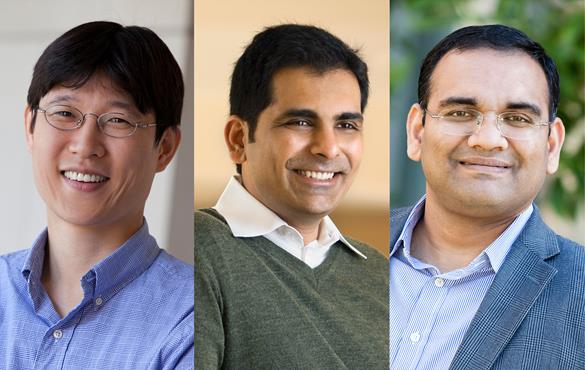Three McKelvey faculty members win research equipment awards
Three McKelvey School of Engineering faculty members will purchase new equipment for their labs with funding from the Department of Defense

Three faculty members in the McKelvey School of Engineering will be able to purchase important equipment needed for their research through grants awarded by the Department of Defense.
The faculty are Tae Seok Moon, associate professor of energy, environmental & chemical engineering; Barani Raman, associate professor of biomedical engineering; and Vijay Ramani, the Roma B. & Raymond H. Wittcoff Distinguished University Professor, also in energy, environmental & chemical engineering.
The highly competitive Defense University Research Instrumentation Program (DURIP) grants provide faculty members the funds to purchase major equipment to perform cutting-edge research. In 2019, the Department of Defense awarded grants to 185 university researchers at 95 institutions totaling $56 million.
Tae Seok Moon, associate professor of energy, environmental & chemical engineering, plans to purchase a liquid handler with accompanying instruments to conduct high-throughput testing function by automating liquid transfer, cell culturing and measurement. The technology will improve the rate of construct testing, maximizing his ability to discover and improve novel biosensors, enzymes, genetic circuits and biomaterials. This highly precise programmed automation will improve the team's ability to reproduce results, allowing the greater academic community to expand on the research.
Raman, in collaboration with Shantanu Chakrabartty, the Clifford W. Murphy Professor in the Preston M. Green Department of Electrical & Systems Engineering, and Srikanth Singamaneni, professor of mechanical engineering & materials science, plans to develop an automated system that includes a robotic surgical setup for microsurgery in small animal models, a light sheet microscope for functional neural imaging, and computational infrastructure for big-data analysis. Raman and his team have been using insects as model organisms to emulate in making a biorobotic nose. The new equipment will allow his team to perform minimally invasive surgical procedures in the insects' exoskeletons to insert the functional imaging equipment. In addition, the state-of-the-art light sheet microscopy allows neural tissue contained on an entire optical plan to be illuminated and imaged, allowing the team to label certain neural populations with calcium indicators. Finally, they will incorporate a GPU-based computer cluster to the robotic surgery and neural imaging setup to analyze the up to 100 GB of raw data generated from the imaging.
Ramani plans to acquire a unique system of instruments that allow construction and evaluation of modular electrochemical devices, including direct-liquid fuel cells, unitized regenerative fuel cells and electrochemical flow cells. The platform will allow the team to build membrane electrode assemblies at scales ranging from lab scale to commercial scale and has the ability to evaluate cells for extended time periods in a safe and controlled way. The system includes a programmable coater that allows uniform coatings on to modular substrates as well as a modular electrochemical cell evaluation platform that allows the researchers to perform electrochemical cell evaluation at multiple scales. Ramani said the new instruments will be used in his current research project funded by the Office of Naval Research.





